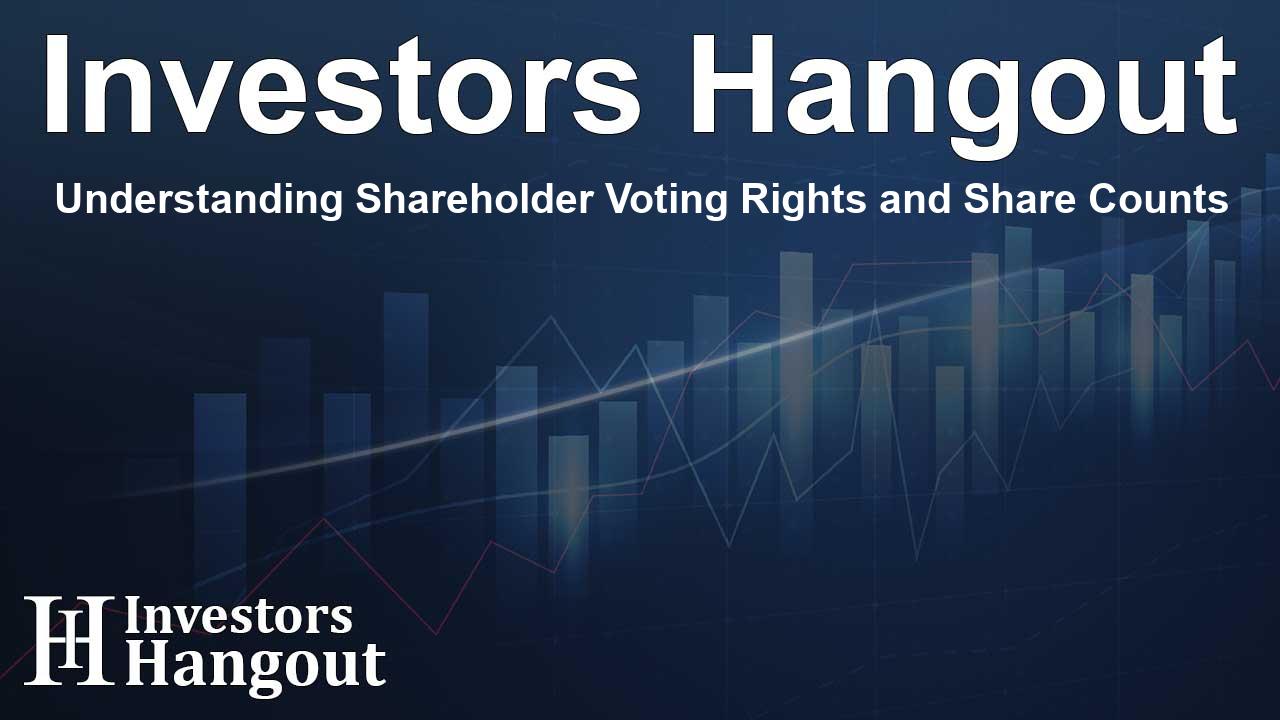Understanding Shareholder Voting Rights and Share Counts

Total Shares and Voting Rights Overview
Understanding the share structure of a company is crucial for any investor. This article will explore the total number of shares and the associated voting rights, focusing on the information outlined in the French Commercial Code and the financial regulations set forth by the Autorité des Marchés Financiers.
Share and Voting Rights Dynamics
According to Article L. 22-10-46 of the French Commercial Code, a measure that has been in effect since April 2016, fully paid-up shares can earn a double voting right. This is given to shares held in a registered form under a single name for a minimum of two years. Such a policy aims to encourage long-term shareholding amongst investors, creating a stable shareholder base.
Current Share Statistics
On May 31, 2025, the total number of shares outstanding stands at 2,660,056,599. This figure is significant as it serves as the foundation for determining both the total voting rights and the shareholding influence investors wield within the company. The importance of these figures cannot be overstated, as they directly impact shareholders' ability to influence corporate decisions.
Voting Rights Structure
On the same date, the number of treasury shares without voting rights was reported at 1,676,848. Treasury shares represent stock that a company has repurchased from shareholders, now held in the company's accounts. Importantly, these shares do not confer voting rights, which can dilute the influence of existing shareholders if they represent a considerable portion of the total shares.
Insights from Recent Months
Looking back at previous months leading up to May 31, 2025, the trajectory of share counts and voting rights reveals various trends. As of January 31, 2025, shareholders held a total of 3,172,669,760 theoretical voting rights. This number showcases the weight of shares actively in circulation affecting company decisions.
Monthly Comparison
Throughout several months, trends like fluctuating numbers of treasury shares have been observed. For instance, on April 30, 2025, treasury shares stood at 1,541,848, a bit lower than in May. Such variations can reflect changes in the company's strategy or market conditions.
Calculating Theoretical Voting Rights
Theoretical voting rights are calculated based on all shares that are entitled to voting privileges, which also includes shares that do not possess voting rights. The calculated amount provides a comprehensive view of how the shares are distributed to facilitate accountability and stakeholder engagement.
Impact on Decision-Making
The structure of shares and voting rights significantly impacts investor decision-making and the company’s governance. A robust voting framework empowers shareholders, granting them authority to influence significant corporate decisions such as mergers, acquisitions, or changes in strategic direction.
Conclusion and Investor Impact
The data surrounding the total number of shares and voting rights reflects not just the financial health of Orange—whose stock is denoted as Paris:ORA—but also the engagement level of its shareholders. Understanding these components is essential for stakeholders committed to informed investment choices.
Frequently Asked Questions
What is the total number of shares outstanding as of May 31, 2025?
The total number of shares outstanding is 2,660,056,599.
How are voting rights calculated for shareholders?
Voting rights are calculated based on all shares to which rights are attached, including those without voting rights.
Why do treasury shares not confer voting rights?
Treasury shares are held by the company itself and are not used for voting, which prevents dilution of existing shareholders' influence.
What recent trends have been observed in share counts?
Recent months have shown variations in treasury shares, impacting theoretical voting rights held by stakeholders.
Why is understanding shares and voting rights important for investors?
These figures influence corporate governance, shareholder rights, and overall investment strategy, making them crucial for informed decision-making.
About The Author
Contact Evelyn Baker privately here. Or send an email with ATTN: Evelyn Baker as the subject to contact@investorshangout.com.
About Investors Hangout
Investors Hangout is a leading online stock forum for financial discussion and learning, offering a wide range of free tools and resources. It draws in traders of all levels, who exchange market knowledge, investigate trading tactics, and keep an eye on industry developments in real time. Featuring financial articles, stock message boards, quotes, charts, company profiles, and live news updates. Through cooperative learning and a wealth of informational resources, it helps users from novices creating their first portfolios to experts honing their techniques. Join Investors Hangout today: https://investorshangout.com/
The content of this article is based on factual, publicly available information and does not represent legal, financial, or investment advice. Investors Hangout does not offer financial advice, and the author is not a licensed financial advisor. Consult a qualified advisor before making any financial or investment decisions based on this article. This article should not be considered advice to purchase, sell, or hold any securities or other investments. If any of the material provided here is inaccurate, please contact us for corrections.
